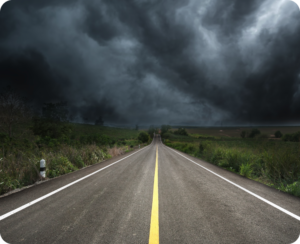Autumn is here! The city gets prettier, the weather starts to cool, the nights get cozier, the clothes are layered, Halloween is on the way, and suddenly– everything is made with pumpkin! And while the song might talk about the leaves in the backyard, there is a lot more that happens with this change of season, and it is always best to be alert and proactive.
A well-kept home keeps the cool air out and energy bills low, but it can also avoid many common home insurance calls in the winter.
For those of you who have just moved into a house and have never had to deal with autumn, or even if you are already experienced but have had a hard time due to lack of maintenance, we have created a handy list of everything that you need to prepare for winter!
1. Inspect your Roof
With colder weather approaching, it is always a good idea to inspect your roof for wear that can worsen with frigid temps. This can include:
- Ripples, warping or damaged tiles
- Rust, cracked seal or open seams in your roof or chimney flares.
- Missing or damaged chimney cover.
- Moss stains.
- Cracked or worn rubber around pipes and vents.
All of this can happen over time. Wear and tear and lack of maintenance are important points of exclusion in home insurance. However, keeping your home in good condition can protect you from bigger problems.
2. Get an Eye on Those Gutters
It is not autumn without leaves in your backyard. There are leaves everywhere and one of their favorite places to gather is in the gutters of your house! Throughout the season, check the gutters frequently and as soon as the leaves stop falling, carry out a more robust maintenance.
The more leaves that are in your gutters, the more likely they will clog and cause a problem during storms or when the snow starts to get heavy. It is also a good idea to make sure your gutters are pointing away from the foundation of your home, which will be very helpful for the rain and thawing snow.
3. Check your Walls and Windows for Gaps
It can be hard to pay attention to every detail of your home, especially the areas that we use less. Now is a good time to check to see if there are any gaps or cracks in your walls. Temperature changes can warp the wood and directly affect the fittings of windows and doors, so look carefully and don’t forget about the basement!
Make sure everything is fitted and sealed. If it rains and water enters a gap and causes damage, your Homeowner Insurance policy may not cover it if your provider thinks it could have been avoided with regular maintenance.
Another point to consider is that in winter, the critters outside may be looking for shelter and food. You can’t be too careful to take measures so that you don’t end up finding a few unwanted tenants in your pantry or basement.
4. Clean your Heating System
You know you’re going to need your heating system in full force in winter, so why take the chance? Keeping the system clean and working well, in addition to avoiding unforeseen events in your day to day, will keep you warmer, the energy use more economical and, above all, avoid the risk of accidents. A fire caused by a poorly maintained heating system can be cause for denial of coverage.
An important step is to check the air filters and to vacuum up dust and debris, and replace them frequently. In general, it is recommended that you change filters every 90 days, but this depends on the type of filter you use and the environmental conditions in your home. For example, if there is anyone with respiratory problems, such as asthma, it is better to change every 6 weeks, if you have pets, every 60 days. It is important to consider the frequency of use, the size of your home, and the air quality in your area.
Everything clean and new filters installed? Take the opportunity to call a professional to check the system’s operation to guarantee everything is ready for the cold.
5. Avoid Falls and Trips
Check the sidewalk for cracks and seal any you might find. Small cracks can expand during winter as water enters and freezes.
Make navigating your home safer by checking that all stairs and handrails are in good condition, making sure the railings are secure and that the driveway is in good condition to facilitate digging. When the area is covered in ice and snow, just walking from the driveway to the front door can be quite a challenge.
Avoiding this type of accident not only protects your family, it also avoids a future liability process should a future visitor suffer an accident.
6. Prepare your External Plumbing
We’ve already talked about how damage caused by broken pipes and roof leaks is usually covered by your home insurance and how items that are damaged may still be covered by your personal property coverage, but why take the chance?
Here are some things you can do to avoid any unforeseen circumstances:
- Drain your hoses.
- Close the external taps.
- Insulate outer tubes to prevent freezing and bursting.
- Check for insulation in internal pipes, especially in unheated areas.
7. Stock Up
Make a list of the things that you may start using in the fall that you will certainly need in the winter. Examples are a shovel and salt for the snow, fuel for the snowblower, and firewood if you have a fireplace.
Take the opportunity to acquire these things little by little, organizing storage spaces and ensuring the necessary supplies. Buying before demand builds can be economical and can help you find the brands you prefer.
8. Fire Safety
Test smoke detectors and carbon monoxide detectors and replace batteries if necessary. 21% of home fire deaths occur in homes with smoke alarms that aren’t working. Check the extinguisher expiration date and replace if necessary. This is a helpful tip for the whole year!
9. Review your Home Insurance Policy
Many things that can happen in winter are covered in your standard home insurance and others must be insured separately. Make sure your insurance meets all your needs before anything happens, check maps of flood zones, fire hazards, and other hazards that your home is exposed to.
Breezy Seguros reviews your home insurance for free, without obligation and you can even get discounts on installments.
10. Make Maintenance a Habit
Fall house maintenance can protect you throughout the winter, even if the winter isn’t quite as severe where you live. Having a house is a lot of work! It takes a lot more time to look after than an apartment, but the work pays for itself on the long summer days outside, doesn’t it?
Taking the time to handle basic maintenance is essential to keeping your home in good working order. This doesn’t have to be confined to autumn; it is much easier to handle if it is spread out!








